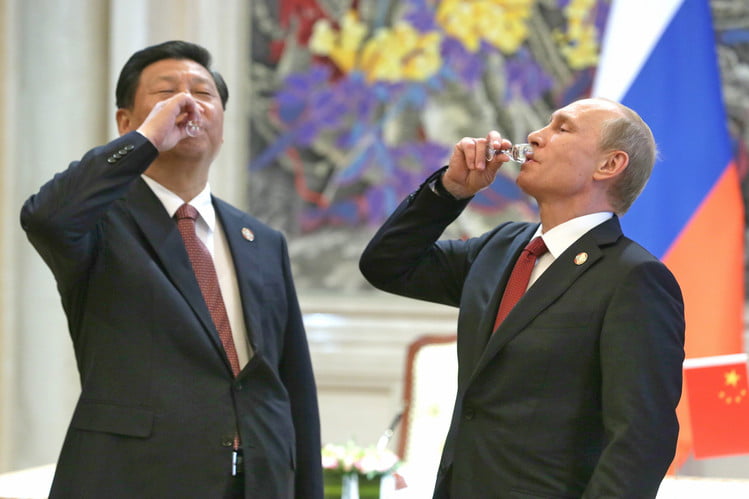Since 2014 with Russia seizing the Crimea, it is clear that President Putin has an agenda to expand Russia. The current Ukrainian-Russian war is in the next step. How can Europe and NATO best meet this challenge?
BG (Retired) Preziosa ended our conversation by discussing the nature of the challenges facing the democracies and some key elements of how to meet those challenges.
Preziosa went back to the early 1990s and underscored that the nuclear deal made in that period of time laid the foundation for the current crisis. This is how he put it: “John J. Mearsheimer in a Foreign Affairs article one year before the Budapest argued that a denuclearized Ukraine, was not positive either for Kiev or for the stability of the Central and Eastern European quadrant. Mearsheimer added that the widespread belief of the time, also promoted by then U.. S President Bill Clinton, was wrong with regard to the benefits of denuclearizing Ukraine.”
Preziosa then cited the perspective of President Macron with regard to the new situation facing Europe and the United States.
“President Macron in an interview to Étien Gernelle affirmed that we are at the beginning of new era and war is back in Europe since Yugoslavia disorders. A nuclear armed power is threatening a nuclear attack for territorial aggrandizement reasons and this is a big change in the grammar of deterrence.”
Preziosa argued that the current Russian aggression against Ukraine is different from Crimea in a fundamental way. “If in 2008 in Georgia and in 2014 in Ukraine, Russia had intervened in reaction to other events, this time it deliberately chose war, and this is a great rupture with the past. The rupture comes by progressive tendency of Vladimir Putin starting in 2008 in Georgia with the perception of possible NATO enlargement followed by the Western weakness in Syria in 2013 when chemical weapons were used.
“Putin has convinced himself of, about a betrayal of the 1990 agreements, an expansion of NATO with a willingness to annihilate his country, to have been abandoned by the West in the Caucasian crisis, essential for Moscow above all because they are lined to Islamic terrorism. Western countries did not understand the consequences in 2014, after the annexation of Crimea and secession of Donbass.”
He added: “Putin has launched an offensive operation based on the perceived weakness of the West. and deduced that the Western democracies were weak.”
He quoted Macron: “All this does not happen in a day. But today the bill has arrived.”
He noted that there are significant spillover effects globally from the war in Ukraine and certainly in Europe. “The events in Ukraine are destabilizing for the Western Balkans which are subject to Turkish, Russian and Chinese influences. The hot spot in the Balkans is Kosovo that never reached political stability with Serbia.”
In addition to the Russian challenge, China is ramping up its global reach and capabilities as well. As Preziosa put it: China is challenging America’s role as the world’s sole superpower.
As a result of the China’s widening influence, spheres of global dominance are projected for the future between the authoritarian and democratic powers.
“Since market liberalizations in 1978, China’s economy has doubled every eight years. Four of the largest banks in the world (by asset) are in China, in the age of easy money, and it is the largest creditors in the world.
“The era of America’s singular dominance is being challenged across multiple strategic domains, with several second-order outcomes. Recent trade wars have caused fractures between the two nations’ trade relationship. Cross border trade settlement in renminbi instead of US dollars has risen exponentially since 2010.China’s Belt & Road initiative has signed agreements with 138 countries. Globally, there are over 3485 megaprojects backed by China’s government.
“The competition between great powers with a clear distinction between the objectives of the democracies and the authoritarian powers.”
But the democracies themselves face divisions not just among themselves but internally within each democratic state. Finding cohesion where possible is crucial to shape a way ahead to deal with the authoritarian challenges globally.
Preziosa underscored that “In the U.S. and in Europe much remain to be done to put their political systems in order and preserve the political and economic strength of the world’s major democracies.”
And his own country, Italy, certainly faces core security challenges along with political ones which need to be met as part of an overall response to the defense challenges posed by the authoritarian powers.
As he concluded: “Russia’s aggression against Ukraine has brought out the extremely risky character of Europe’s energy dependence on Moscow. The side effect of the Ukrainian crisis affects the Middle East and North Africa in terms of the energy issues and food security.
“The fear is that discontent will generate new waves of instability and migratory flows to Italy and Europe. Italy is one of the European country most dependent on Russian energy supplies, and the energy issue can only assert itself as the first point to be addressed. The first step taken by Italy has been to turn to third countries that produce and export energy, to diversify our sources of supply and pursue our energy security. This strategy has involved both African countries and North African countries such as Egypt, Algeria, and Egypt.
“Italy needs to find an internal political stability as well to shape not only its way ahead but to play the kind of role which is needed for expanded European influence and cohesion in dealing with the 21st century authoritarian challenges.”
For the first two pieces in this series, see the following:
The War in Ukraine and the Challenge of Reshaping European Direct Defense
And for our book addressing the authoritarian challenges to European direct defense, see the following:


